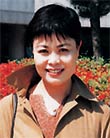Tie Ning has four sets of eyes, one as a citizen, one as a countrywoman; one as a man and one as a woman. She observes the countryside through looking at things as as a citizen, and casts her gaze as a countrywoman on city life. Likewise, she can tell stories of women from a man's point of view. All the characters she has written, no matter man or woman, citizen or countryman, are able to stand out vividly as real people to her readers. She is an inborn writer with strong and natural story-telling ability.
 Born in Beijing in 1957, Tie Ning went to the countryside to experience rural life in 1975. In 1979 she was transferred to the Baoding Branch of the Chinese Federation of Art and Literature and in 1984 to the Creative Writing Workshop of Hebei Province. She is now vice chairperson of the Chinese Writers Association and chairperson of the Hebei Provincial Writers Association. Her Ah, Xiangxue won a national award as one of the best short stories of 1982, The Red Shirt Without Buttons and June's Big Topic won national awards in 1984. Since 1980, Tie Ning has published Path in the Night and other collections of short stories and novellas.
Born in Beijing in 1957, Tie Ning went to the countryside to experience rural life in 1975. In 1979 she was transferred to the Baoding Branch of the Chinese Federation of Art and Literature and in 1984 to the Creative Writing Workshop of Hebei Province. She is now vice chairperson of the Chinese Writers Association and chairperson of the Hebei Provincial Writers Association. Her Ah, Xiangxue won a national award as one of the best short stories of 1982, The Red Shirt Without Buttons and June's Big Topic won national awards in 1984. Since 1980, Tie Ning has published Path in the Night and other collections of short stories and novellas.
 Invention and honesty
Invention and honesty
In Tie's eyes, there is a tendency among Chinese novelists to neglect honesty in their writing. She remembers a trip to the countryside, where she once caught sight of a small restaurant along the country road. An old man was having a kind of local dish of noodle while seated on a wooden stool in the restaurant. But when her eyes went up to the name of the restaurant, she exclaimed with surprise � it was called the Hilton Hotel.
The Hilton Hotel phenomenon is common in contemporary Chinese novel writing. No writer will be happy if distinguished by superficial writing. So they tend to render the story with deeper thoughts, a thought sometimes hard to understand for normal readers. How deep a novel goes into the reader's heart does not rely on the tactical arrangement of the deep thoughts. It all comes naturally from the sense of the life of the story.
An old writer told Tie more than once that honesty is a must in one's life. But when it comes to novel writing, things are different. It's just far too hard to be honest in writing. But Tie thinks to be honest will help a writer reach a new standard and greater wisdom.
 Rubbish and partial life
Rubbish and partial life
Talking about other female writers, Tie thinks that no one can give a full picture of the world. One, instead, can just reflect the life he or she is experiencing. Partial understanding of life is just unavoidable. So, when judging a writer we may dislike, one must try to throw off preconceived biases and hold back possible complaints. Every writer is expressing his of her own feelings about life with his or her heart and words, whether we are inclined to agree with them.
